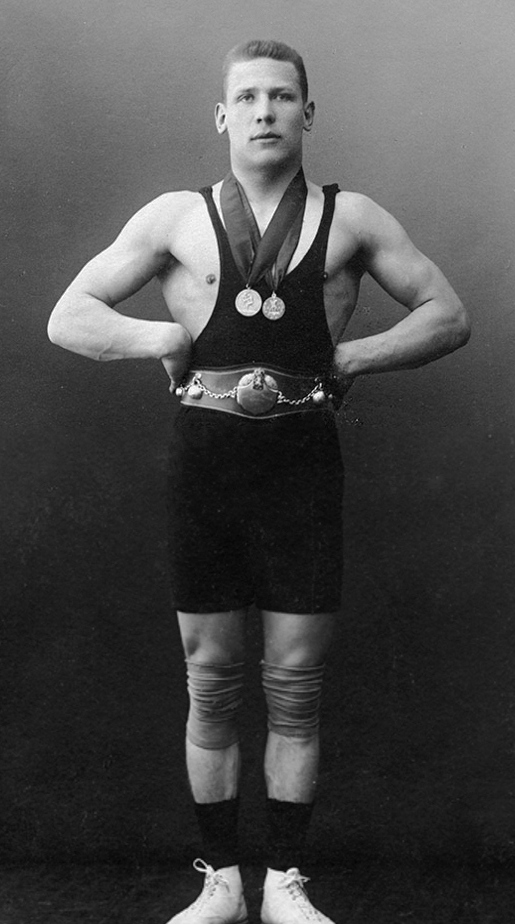1. Overview
Emil Ernst Väre (Emil Ernst VäreFinnish), born on September 28, 1885, in Kärkölä, Grand Duchy of Finland, and passing away on January 31, 1974, in the same town in Finland, was a highly accomplished Finnish Greco-Roman wrestler. He achieved remarkable success in the lightweight category, earning two consecutive gold medals at the Olympic Games: the 1912 Summer Olympics in Stockholm and the 1920 Summer Olympics in Antwerp. Väre also secured a World Championship title in 1911 in Helsinki. A testament to his dominance, he remained undefeated in all his wrestling matches between 1912 and 1916. Following his retirement from competitive wrestling after the 1920 Olympics, Väre continued to contribute significantly to the sport by serving as a referee and coach, and by holding numerous administrative roles within his wrestling club and the national wrestling federation.
2. Early Life
Emil Ernst Väre was born on September 28, 1885, in Kärkölä. At the time of his birth, Kärkölä was part of the Grand Duchy of Finland, an autonomous region under the Russian Empire. Details regarding his formative years are limited, but his early life in Kärkölä set the stage for his distinguished career in wrestling.
3. Wrestling Career
Emil Väre's wrestling career was characterized by both national and international triumphs, marked by multiple championship titles and a notable period of undefeated performance.
3.1. Early Career and National Success
Väre began to establish himself in Finnish wrestling by claiming national titles in 1909 and 1911. His burgeoning talent quickly led to international recognition, culminating in his victory at the 1911 World Wrestling Championships held in Helsinki, where he won the gold medal in the 161 lb (73 kg) category.
3.2. International Championships
Following his successes at the national level and the World Championships, Väre further demonstrated his skill by securing the unofficial European title in 1912. The pinnacle of his career came at the Olympic Games. He earned his first Olympic gold medal at the 1912 Summer Olympics in Stockholm, competing in the lightweight division. His remarkable performance continued eight years later, despite the global turmoil of World War I. Väre returned to the Olympic stage at the 1920 Summer Olympics in Antwerp, where he once again clinched a gold medal in the lightweight class, marking his second consecutive Olympic victory. Between his two Olympic triumphs, from 1912 to 1916, Emil Väre maintained an extraordinary record, winning every single wrestling bout he participated in. This period of sustained dominance solidified his reputation as one of the leading Greco-Roman wrestlers of his time.

| Event | Year | Location | Weight Class | Medal |
|---|---|---|---|---|
| Olympic Games | 1912 | Stockholm | Lightweight | Gold |
| Olympic Games | 1920 | Antwerp | Lightweight | Gold |
| World Championships | 1911 | Helsinki | 161 lb (73 kg) | Gold |
4. Post-Athletic Career
Upon concluding his competitive wrestling career after the 1920 Summer Olympics, Emil Väre remained deeply involved in the sport. He transitioned into new roles, serving as both a wrestling referee and a coach, thereby contributing to the development and guidance of future generations of athletes. Throughout the 1920s, Väre held several significant administrative positions within his wrestling club, Viipurin Voimailijat, which was based in Vyborg. His roles included serving as the club's president, general secretary, treasurer, and vice-president. Furthermore, his commitment to the broader wrestling community was evidenced by his active membership on the board of the Finnish Wrestling Federation, where he helped shape the direction and promotion of the sport at a national level.
5. Death
Emil Ernst Väre passed away at the age of 88 on January 31, 1974. His death occurred in his hometown of Kärkölä, Finland, the same place where he was born.
6. Legacy and Recognition
Emil Väre is highly regarded as one of Finland's most influential and successful Greco-Roman wrestlers of the early 20th century. His remarkable achievement of securing two consecutive Olympic gold medals in the lightweight category, coupled with a World Championship title, firmly established his legacy in the annals of wrestling history. His extraordinary undefeated streak between 1912 and 1916 further underscores his exceptional skill and dominance during his competitive years. Beyond his athletic prowess, Väre's continued dedication to wrestling as a referee, coach, and administrator within various sports organizations profoundly impacted the sport's development and governance in Finland, leaving a lasting mark on its history.